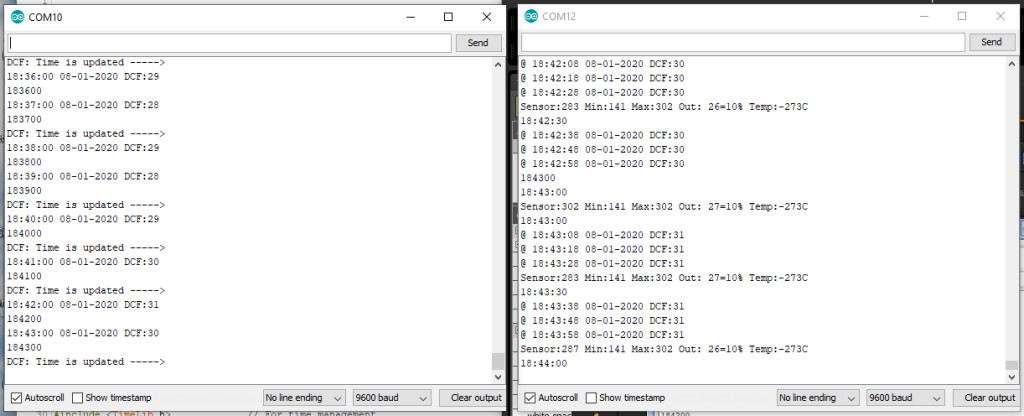

The Arduino
Nano Every board is used to decode a
DCF77-time signal received with a DCF77-ferrite receiver and transmits time and date
with a HC-12 module
in the air as text.
The DCF77-signal is a pulse that is send every second into the ether with a length
of 0.1 or 0.2 second.
The short and long pulse represents a 0 and 1.
When 59 bits are sent the program can extract the time date from this binary
string. The 60th bit is a second pause without a pulse.
Using interrupts
The standard Arduino DCF77-library of Thijs Ellenbaas was used to setup the
program.
Libraries are a good start but a disadvantage is that from one to the other day they are not available
anymore.
Because they must be robust and have many functions they often consume more
program memory than necessary.
Interrupts are nice but it are interrupts and therefore unpredictable.
A different approach
Arduino programs runs in a loop. In this loop() input is checked and output
generated by the subroutines called from within the loop().
In our example the DCF77-signal can be read over 15000 time a second in this
loop.
Because the pulses are 0.1 or 0.2 second in length they can be easily
discriminated from each other by just counting the 0 and 1 on the digital pin
attached to the receiver.
The start time of the counting is irrelevant as long as it is 1000 msec long. It
is not necessary to wait for the rising or falling edge of the signal.
Of course there must be enough counts (>1000) in a second. Therefor the program
may not use delays is one of its functions.
The short pulse of 0.1 second must lie between 5% and 15% of the counts and the
1 pulse must lie between 15 and 30%.
As a refinement one can start counting after say 100 successive counts otherwise
it is a spike. This value will depend of how many counts a second the program
can read
This is the variable DCFValidGate in the program.
In the picture below the DCF-signal with the 60 second-gap is shown.
The DCF77-signal is disturbed by microwaves, cheap power supplies and other electronics but also by
WS2812 and SK6812 colour LED's.
These LED's contain a small chip which frequency disturbs the signal if the
receiver is close by.
Also receivers that receive DCF49- , DCF39- and HGA22-signals are
interfered
by these chips.
These RGB-colour chips are used in my word clocks.
In contrast with the other modules like the NRF24L01
and several 433 and 866 MHZ Transmitter/Receivers the
HC-12 module was very easy to implement and worked
directly without complicated coding. It behaves as an ordinary RS232-connection.
It can also easily be exchanged with HM-05 and HM10 Bluetooth modules without
changing the connections and program code.
The DCF-77 library of Thijs
Ellenbaas uses an interrupt routine to detect the signal. A tricky thing
about interrupts is that the trigger is processor dependent and does not work on
all pins in the ATMEGA chips.
The usage of the Arduino
Nano Every was an experiment to see of the time transmitter would work
with it.
As expected the interrupts were different. For an Arduino
Uno and Nano the interrupt number for pin 2 is 0 and for the Nano Every
interrupt number
is 2.
The hardware
The connections are simple. I used one of the PCB's that
are used for the Fibonacci and
Word clocks.
The
Fritzing file is here
the HC-12 module has similar connections as the HC-05 and HM-10 Bluetooth
modules.
Only RX and TX are reversed but this is taken care of in the coding.
HC_12TX = 6, // HC-12 TX Pin HC_12RX = 7, // HC-12 RX Pin
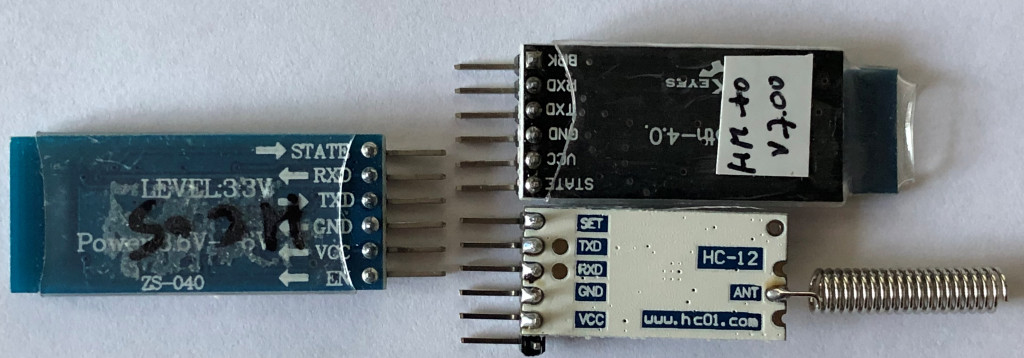
The 1.1K/2.2K voltage divider can be left out. Because several Bluetooth modules
are not 5V tolerant a voltage divider is on this PCB to reduce the voltage to
3.3V.
The HC-12 can be connected directly to the Arduino pins but works also fine with
the voltage divider. RX to TX and TX to RX!
On
this page the HC-12 and its programming is clearly explained (or
use this link if the site has become obsolete)
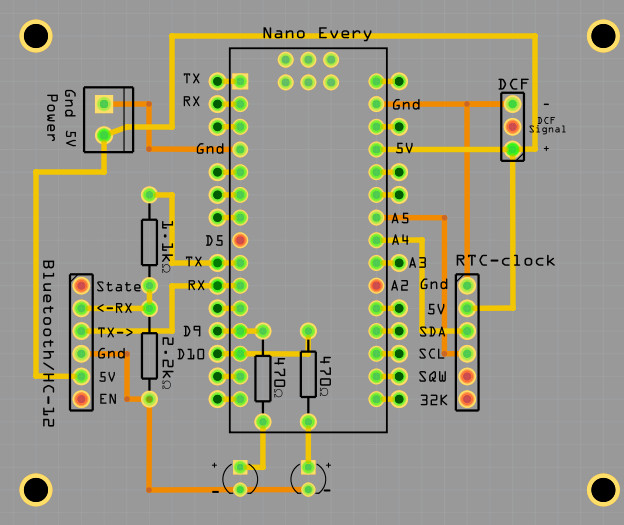 |
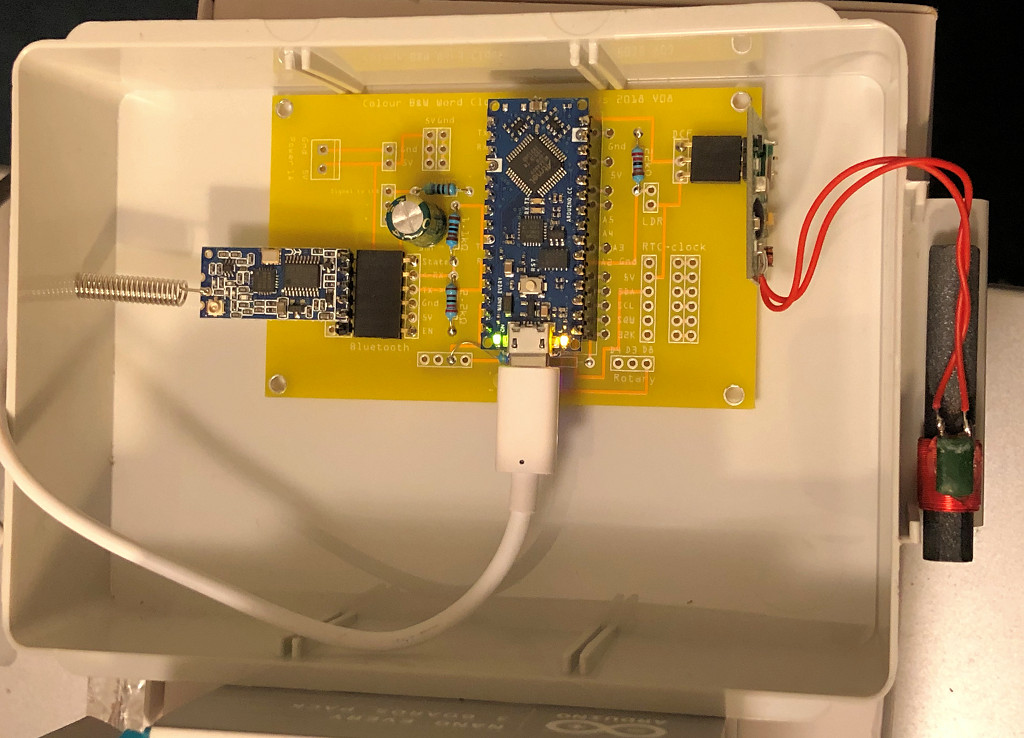 |
| Fritzing PCB | The transceiver running |
With the #define modules cq coding can be used or disabled.
If no DS3231 module is installed the program uses the Arduino clock. This is
fine when the DCF-receiver is working fine
In this case no LCD is installed.
#define DCFMOD // Use the Arduino DCF77 library with interrupts #define DCFTINY // Use the Tiny DCF algorithm in this program #define HC12MOD // Use HC12 time transreceiver Long Range Wireless Communication Module //#define LCDMOD // LCD 2 x 16 installed #define MOD_DS3231 // DS3231 RTC module installed
After declarations, initialisations and the setup subroutine the program enters the loop.
The loop is very simple
void loop(void)
{
SerialCheck();
EverySecondCheck();
EveryMinuteUpdate();
#ifdef DCFMOD
DCF77Check();
#endif DCFMOD
}
The Serial- and DCF77-input is checked every loop and in this program that is over 15000 times a second. In the EverySecondCheck routine the difference between the last time the routine was entered must be greater than 0.999 seconds. After 50 msec the seconds tick LED is turned of. With the #ifdef part of the program are compiled or not compiled. It is wise to leave out program code for parts that are not used. It can only interfere and makes the program larger. Every second void EverySecondCheck(void) { if ( millis() - msTick > 50) { digitalWrite(secondsPin,LOW);} // Turn OFF the second on pin 13 if ( millis() - msTick > 999) // Flash the onboard Pin 13 Led so we know something is happening { msTick = millis(); // second++; digitalWrite(secondsPin,HIGH); // turn ON the second on pin 13 ++SecPulse; // second routine in function DimLeds GetTijd(0); // synchronize time with RTC clock #ifdef LCDMOD Print_tijd_LCD(); #endif LCDMOD #ifdef HC12MOD // disabled with the x HC12MODx if( (Inow.second()==10) ) // When HC12 sends it disturbs DCF-signal. In seconds 1 - 19 are whether info bits { // Now we can send some info sprintf(sptext,"@ %0.2d:%0.2d:%0.2d %0.2d-%0.2d-%0.4d DCF:%0.2d", Inow.hour(),Inow.minute(),Inow.second(),Inow.day(),Inow.month(),Inow.year(),DCF_signal); HC12.print(sptext); } #endif HC12MOD } }
Decoding the DCF77-signal
In the DCF77Check() routine the signal of the DCF77 is updated.
The Arduino library working with interrupts gives a DCFtime==TRUE if a valid time is calculated
In the case of the DCFtiny routine the digital signals are counted and every minute decoded in UpdateDCFclock().
A scarcely used "if then else" is used in this routine:
if (LastGateValid > DCFValidGate ? SumSecondignal++ : DiscardedSignals++ );
if (True ? then : else);
//--------------------------------------------
void DCF77Check(void)
{
byte LHbit = 1 - digitalRead(DCF_PIN); // write inverted DCF pulse to LED on board
digitalWrite(DCF_LED_Pin, LHbit );
#ifdef DCFMOD
time_t DCFtime = DCF.getTime(); // Check if new DCF77 time is available
if (DCFtime!=0)
{
Tekstprintln("DCF: Time is updated -----> ");
sprintf(sptext,"%0.2d%0.2d%0.2d",Inow.hour(),Inow.minute(),Inow.second());
Tekstprintln(sptext);
DCF_signal+=2;
setTime(DCFtime);
RTCklok.adjust(DCFtime);
// Ellenbaas++;
}
#endif DCFMOD
#ifdef DCFTINY
SumSignalCounts += 1; // Noof of counted signals
if(LHbit)
{
LastGateValid++;
if (LastGateValid > DCFValidGate ? SumSecondSignal++ : DiscardedSignals++ );
}
if ( millis() - DCFmsTick > 999) // Compute every second the received DCF-bit to a time
{
DCFmsTick = millis();
if(byte OKstatus = UpdateDCFclock()) // if after 60 sec a valid time is calculated, sent it to the HC-12 module
{
if(OKstatus == 2) // if time flag was OK and date flag was NOK
{
sprintf(sptext," TIME OK --> %0.2d:%0.2d",Dhour, Dminute );
Serial.println(sptext);
RTCklok.adjust(DateTime(Inow.year(), Inow.month(), Inow.day(), Dhour, Dminute, 0));
}
else // if time flag was OK and date flag also OK (OKstatus == 1)
{
sprintf(sptext," TIME OK --> %0.2d:%0.2d %0.2d-%0.2d-%0.4d/%0.1d",Dhour, Dminute, Dday, Dmonth, 2000+Dyear, Dwday );
Serial.println(sptext);
RTCklok.adjust(DateTime(2000+Dyear, Dmonth, Dday, Dhour, Dminute, 0));
}
DCF_signal+=2;
// Ed++;
}
}
#endif DCFTINY
DCF_signal = constrain(DCF_signal,0 ,100); // DCF_signal <100
analogWrite(DCFgood, DCF_signal);
}
#ifdef DCFTINY
//--------------------------------------------
// CLOCK Make the time from the received DCF-bits
//--------------------------------------------
byte UpdateDCFclock(void)
{
byte TimeOK; // return flag is proper time is computed
if (Bitpos >= 60) {Bitpos=0; StartOfMinute = 0;}
if (PrintDebugInfo)
{
sprintf(sptext,"@ %5ld %5ld %3ld %2ld%% Bitpos: %2d",
SumSecondSignal, SumSignalCounts, DiscardedSignals, 100 * SumSecondSignal/ SumSignalCounts, Bitpos );
Serial.print(sptext);
}
if (SumSignalCounts>5000 && SumSecondSignal<500) Bitpos = 59; // if enough signals the one second no signal is found. this is position zero
Receivebit = 9;
int msec = (int)1000 * SumSecondSignal/ SumSignalCounts;
switch(msec)
{
case 0 ... 50: Receivebit = 9; break; // if signal is less than 0.05 sec long than it is nothing
case 51 ... 150: Receivebit = 0; break; // if signal is 0.1 sec long than it is a 0
case 151 ... 250: Receivebit = 1; break; // if signal is 0.1 sec long than it is a 1
default: Receivebit = 2; break; // in all other cases it is an error
}
if (PrintDebugInfo){ sprintf(sptext," Bit: %1d ",Receivebit ); Serial.print(sptext);}
switch (Bitpos) // Ddecode the 59 bits to a time and date.
{ // It is not binary but "Binary-coded decimal"
// and blocks are checked with an even parity bit.
case 0: if(Receivebit==0) StartOfMinute = 1; break; // Bit must always be 0
case 1 ... 19: Paritybit = 0; break;
case 20: if(Receivebit==1)
{
StartOfEncodedTime = 1; // Bit must always be 1
Dsecond = Dminute = Dhour = Dday =Dwday = Dmonth = Dyear = 0;
}
else StartOfEncodedTime = 0;
break;
case 21: if(Receivebit==1) {Dminute = 1; Paritybit = 1 - Paritybit;} break;
case 22: if(Receivebit==1) {Dminute += 2 ; Paritybit = 1 - Paritybit;} break;
case 23: if(Receivebit==1) {Dminute += 4 ; Paritybit = 1 - Paritybit;} break;
case 24: if(Receivebit==1) {Dminute += 8 ; Paritybit = 1 - Paritybit;} break;
case 25: if(Receivebit==1) {Dminute += 10; Paritybit = 1 - Paritybit;} break;
case 26: if(Receivebit==1) {Dminute += 20; Paritybit = 1 - Paritybit;} break;
case 27: if(Receivebit==1) {Dminute += 40; Paritybit = 1 - Paritybit;} break;
case 28: if(Receivebit==Paritybit)
{
if (PrintDebugInfo)
{
sprintf(sptext,"(Min Parity OK %d %d)" ,Receivebit, Paritybit);
Serial.print(sptext);
}
MinOK = 1;
}
else
{
if (PrintDebugInfo)
{
sprintf(sptext,"(Min Parity NOK %d %d)",Receivebit, Paritybit);
Serial.print(sptext);
}
MinOK = 0;
}
Paritybit = 0; break;
case 29: if(Receivebit==1) {Dhour = 1; Paritybit = 1 - Paritybit;} break;
case 30: if(Receivebit==1) {Dhour += 2; Paritybit = 1 - Paritybit;} break;
case 31: if(Receivebit==1) {Dhour += 4; Paritybit = 1 - Paritybit;} break;
case 32: if(Receivebit==1) {Dhour += 8; Paritybit = 1 - Paritybit;} break;
case 33: if(Receivebit==1) {Dhour += 10; Paritybit = 1 - Paritybit;} break;
case 34: if(Receivebit==1) {Dhour += 20; Paritybit = 1 - Paritybit;} break;
case 35: if(Receivebit==Paritybit)
{
if (PrintDebugInfo)
{
sprintf(sptext,"(Hour Parity OK %d %d)", Receivebit, Paritybit);
Serial.print(sptext);
}
HourOK = 1;
}
else
{
if (PrintDebugInfo)
{
sprintf(sptext,"(Hour Parity NOK %d %d)",Receivebit, Paritybit);
Serial.print(sptext);
}
HourOK = 0;
}
Paritybit = 0; break;
case 36: if(Receivebit==1) {Dday = 1; Paritybit = 1 - Paritybit;} break;
case 37: if(Receivebit==1) {Dday += 2; Paritybit = 1 - Paritybit;} break;
case 38: if(Receivebit==1) {Dday += 4; Paritybit = 1 - Paritybit;} break;
case 39: if(Receivebit==1) {Dday += 8; Paritybit = 1 - Paritybit;} break;
case 40: if(Receivebit==1) {Dday += 10; Paritybit = 1 - Paritybit;} break;
case 41: if(Receivebit==1) {Dday += 20; Paritybit = 1 - Paritybit;} break;
case 42: if(Receivebit==1) {Dwday = 1; Paritybit = 1 - Paritybit;} break;
case 43: if(Receivebit==1) {Dwday += 2; Paritybit = 1 - Paritybit;} break;
case 44: if(Receivebit==1) {Dwday += 4; Paritybit = 1 - Paritybit;} break;
case 45: if(Receivebit==1) {Dmonth = 1; Paritybit = 1 - Paritybit;} break;
case 46: if(Receivebit==1) {Dmonth += 2; Paritybit = 1 - Paritybit;} break;
case 47: if(Receivebit==1) {Dmonth += 4; Paritybit = 1 - Paritybit;} break;
case 48: if(Receivebit==1) {Dmonth += 8; Paritybit = 1 - Paritybit;} break;
case 49: if(Receivebit==1) {Dmonth += 10; Paritybit = 1 - Paritybit;} break;
case 50: if(Receivebit==1) {Dyear = 1; Paritybit = 1 - Paritybit;} break;
case 51: if(Receivebit==1) {Dyear += 2; Paritybit = 1 - Paritybit;} break;
case 52: if(Receivebit==1) {Dyear += 4; Paritybit = 1 - Paritybit;} break;
case 53: if(Receivebit==1) {Dyear += 8; Paritybit = 1 - Paritybit;} break;
case 54: if(Receivebit==1) {Dyear += 10; Paritybit = 1 - Paritybit;} break;
case 55: if(Receivebit==1) {Dyear += 20; Paritybit = 1 - Paritybit;} break;
case 56: if(Receivebit==1) {Dyear += 40; Paritybit = 1 - Paritybit;} break;
case 57: if(Receivebit==1) {Dyear += 80; Paritybit = 1 - Paritybit;} break;
case 58: if(Receivebit==Paritybit)
{
if (PrintDebugInfo)
{
sprintf(sptext,"(Year Parity OK %d %d0", Receivebit, Paritybit );
Serial.print(sptext);
}
YearOK = 1;
}
else
{
if (PrintDebugInfo)
{
sprintf(sptext,"(Year Parity NOK %d %d)",Receivebit, Paritybit );
Serial.print(sptext);
}
YearOK = 0;
}
Paritybit = 0; break;
case 59: //Serial.print("silence");
default: break;
}
Bitpos++;
if (PrintDebugInfo)
{
sprintf(sptext," %0.2d:%0.2d %0.2d-%0.2d-%0.4d/%0.1d %d",Dhour, Dminute, Dday, Dmonth, 2000+Dyear, Dwday, Paritybit);
Serial.println(sptext);
}
SumSecondSignal = SumSignalCounts = DiscardedSignals = LastGateValid = DiscardedSignals = 0;
if(Bitpos == 59)
{
if(StartOfEncodedTime && MinOK && HourOK && YearOK)
{ // check is the time differ only one minute from the previous time
uint32_t TimeNow = (((((Dyear * 12 + Dmonth) * 31) + Dday) * 24) + Dhour) * 60 + Dminute;
// sprintf(sptext," Time now %ld :: Previous %ld",TimeNow , TimePrevious); Serial.println(sptext);
if(TimeNow - TimePrevious <= 2) // Time is valid if difference with previous time is one minute
{
TimeOK = 1;
}
TimePrevious = TimeNow;
}
else // Time is not valid
{
if(StartOfEncodedTime && MinOK && HourOK)
{ // check is the time differ only one minute from the previous time
uint32_t TimeNow = Dhour * 60 + Dminute;
// sprintf(sptext," HourMinTime now %ld :: Previous %ld",TimeNow , HourMinPrevious); Serial.println(sptext);
if(abs(TimeNow - HourMinPrevious <= 2)) // Time is valid if difference with previous time is one minute
{
TimeOK = 2;
}
HourMinPrevious = TimeNow;
}
else // if no vslid time stamp add one minute to time previous
{
TimePrevious++;
TimeOK = 0;
}
}
} // --- end if(Bitpos == 59)
return(TimeOK);
}
#endif DCFTINY
Rounding up
The rest of the program explains it self.
The definition below takes care of the interrupt pin definition of the Nano
Every and other Arduino's.
#ifdef ARDUINO_AVR_NANO_EVERY
#define DCF_INTERRUPT 2 // DCF Interrupt number associated with DCF_PIN ( 2 Nano Every)
#else if
#define DCF_INTERRUPT 0 // Nano Uno etc
#endif
DCF77 DCF = DCF77(DCF_PIN,DCF_INTERRUPT,LOW);
#endif DCFMOD
It is possible to use both DCF decoding routines simultaneously or one of the two.
//#define DCFMOD // Use the Arduino DCF77 library with interrupts
#define DCFTINY // Use the Tiny DCF algorithm in this program
Entering a letter A in the serial monitor switches on and off de debugger for the DCFtiny decoding
algorithm.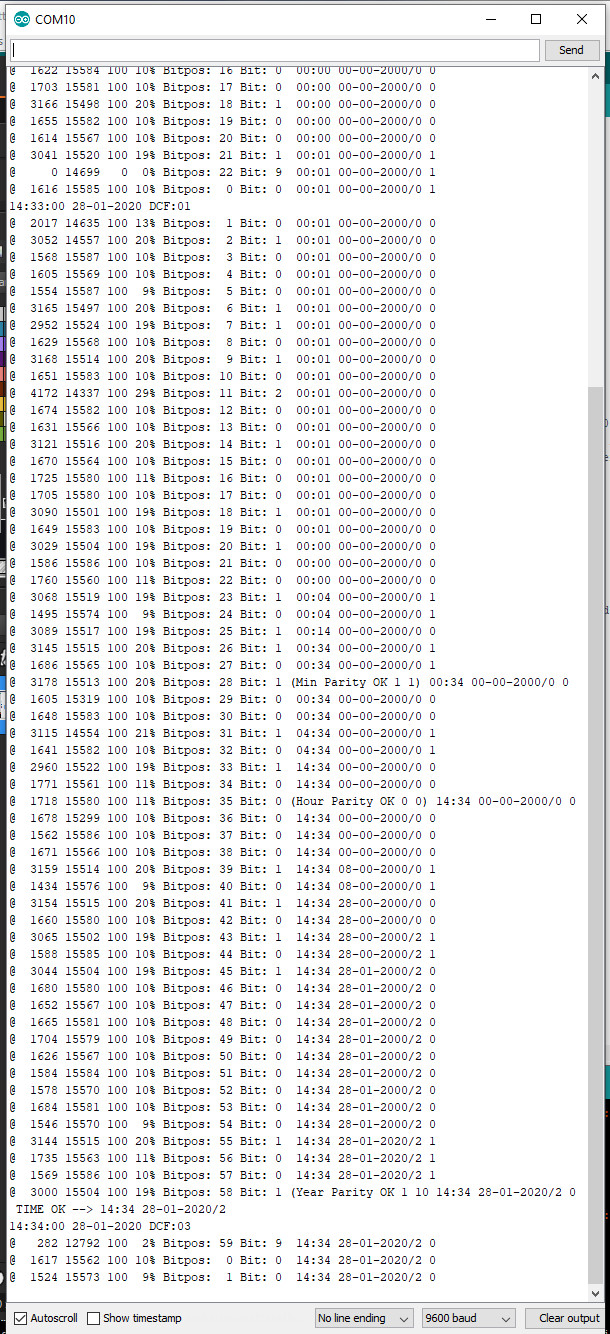
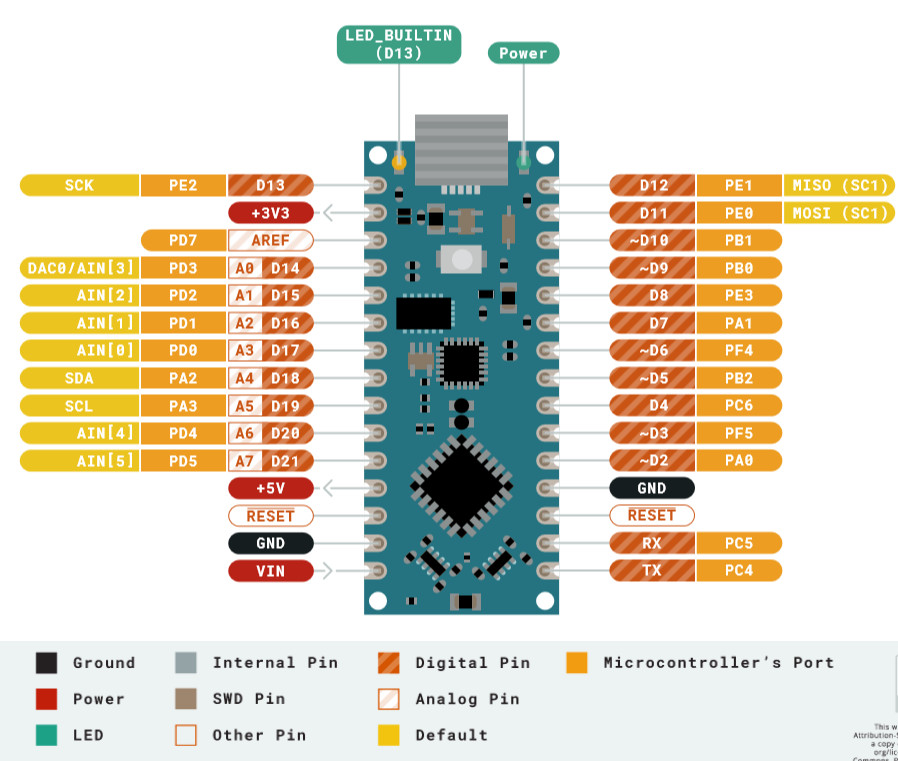
Links
Arduino DCF77 Signal Analyzer Clock
Radio Controlled (RC) of Funk klokken
Meine Arduino-Projekte
Online signal from Mainflingen on website
Explains the bits in the received string
Arduino projects 4you
HKW-Elektronik GmbH
Sells all kinds of receivers
Rheinturmfunkuhr mit
Arduino
Arduino DCF77 radio clock receiver ,Matthias
Dalheimer
Github Thijs Elenbaas
Conrad receiver
TM1637 4 Digit 7
Segment Display Arduino Tutorial
Understanding and Implementing the HC-12 Wireless Transceiver Module
February 2020
Ed Nieuwenhuys